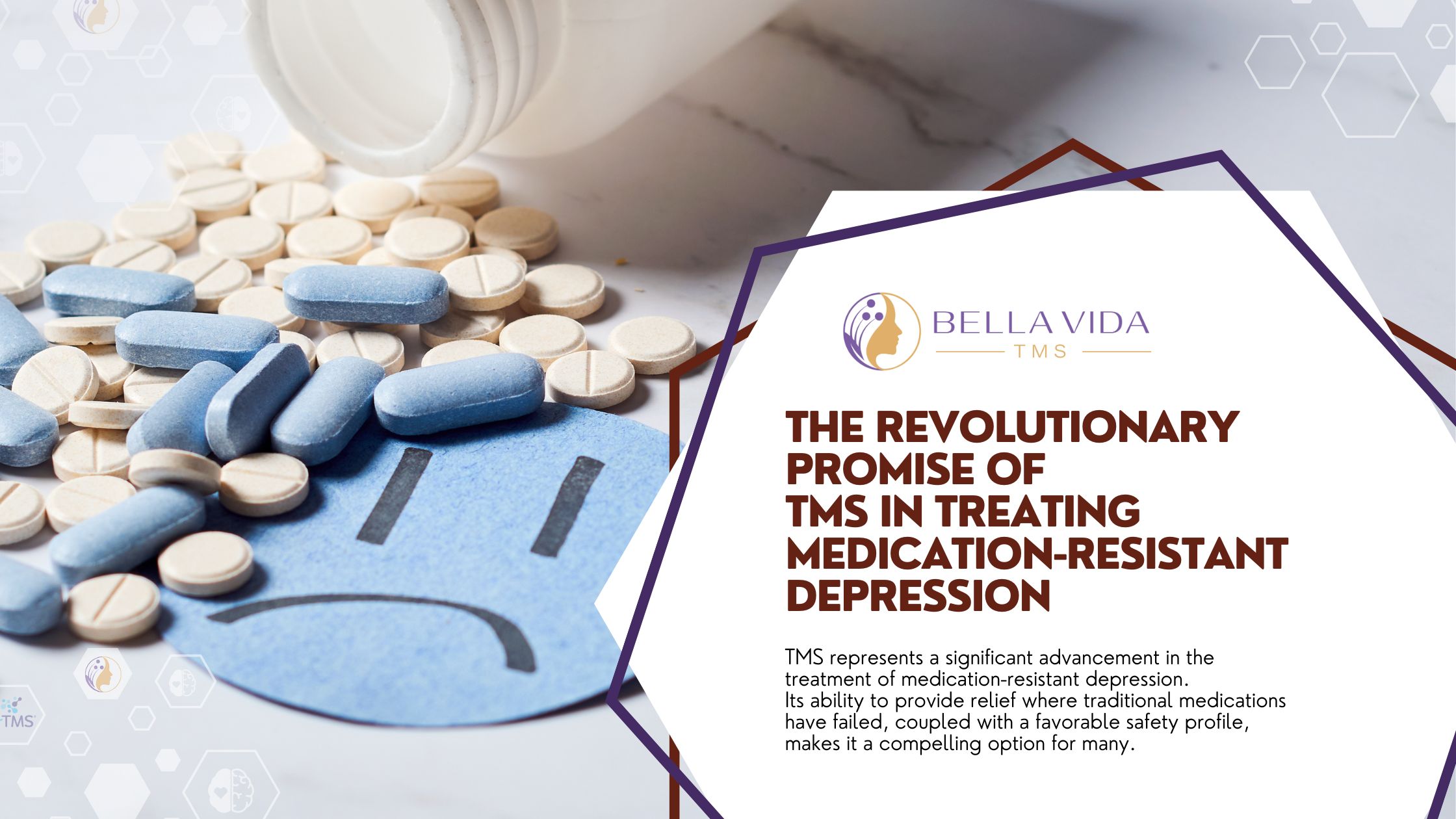Depression, a formidable mental health challenge affecting millions globally, often leaves a trail of despair, especially when conventional treatments fall short. As per the World Health Organization, depression is a leading cause of disability worldwide, affecting over 264 million people. Traditional treatment methods, primarily antidepressant medications, have been the cornerstone of battling this condition. However, a significant portion of patients – about one-third – do not respond to these medications, a scenario termed ‘medication-resistant depression’.
Enter Transcranial Magnetic Stimulation (TMS), a groundbreaking approach offering new hope in this relentless fight. TMS, a non-invasive procedure, uses magnetic fields to stimulate nerve cells in the brain, targeting areas implicated in mood regulation. The FDA approved TMS for treatment-resistant depression in 2008, heralding a new era in mental health treatment.
The Limitations of Traditional Antidepressants
While antidepressants are effective for many, they come with limitations. A substantial number of patients either do not achieve complete remission or suffer from side effects that can sometimes exacerbate their condition. Side effects can range from mild (nausea, headaches) to severe (weight gain, sexual dysfunction, emotional numbing), contributing to non-compliance and treatment discontinuation. Moreover, long-term use of these medications poses risks, including potential increase in suicidal thoughts, particularly in young adults.
TMS: A Beacon of Hope
TMS stands out as a beacon of hope for those struggling with medication-resistant depression. It bypasses the systemic side effects of medications by directly targeting the brain regions involved in depression. The most common side effect of TMS is mild discomfort or headache during or after treatment, which typically subsides quickly.
The Efficacy of TMS
Numerous studies have validated the efficacy of TMS in treating depression. A pivotal trial published in the Journal of Clinical Psychiatry showed that TMS produced significant improvements in depressive symptoms in patients who did not respond to antidepressants. Another study in the American Journal of Psychiatry found that TMS had a 30% remission rate in treatment-resistant patients, a notable achievement considering the lack of response to other treatments.
Real-World Impacts of TMS
The impact of TMS extends beyond clinical trials. Real-world experiences mirror the positive outcomes. Patients report significant improvements in mood, energy levels, and overall quality of life. Importantly, the benefits of TMS can be long-lasting. A study in the Journal of Clinical Psychiatry found that 62.5% of patients who responded to TMS maintained their response over a 12-month period.
Safety Profile of TMS
The safety profile of TMS is another reason for its rising popularity. The risk of seizures, often a concern with brain stimulation techniques, is exceedingly rare in TMS when standard protocols are followed. This makes TMS a safe option for the majority of patients, including those who might be at higher risk with antidepressant medications.
TMS and the Future of Depression Treatment
The evolving landscape of TMS research is expanding its potential. Studies are exploring its use earlier in the treatment process, not just as a last resort. There’s also growing interest in personalizing TMS treatment, tailoring parameters like frequency and location of stimulation to individual patient profiles, potentially enhancing effectiveness.
A Personal Journey with TMS
Take, for instance, the story of Sarah (name changed for privacy), a 35-year-old who battled depression for over a decade. After cycling through multiple antidepressants with little relief and considerable side effects, Sarah turned to TMS. The changes were gradual but profound. By the end of her treatment course, Sarah experienced a significant reduction in her depressive symptoms, with minimal side effects. Stories like Sarah’s are becoming increasingly common, offering a glimmer of hope to those who felt they had exhausted their options.
The Road Ahead
The journey of TMS in the mental health landscape is just beginning. As research expands and technology advances, its role in treating depression is poised to grow. For those grappling with medication-resistant depression, TMS stands not just as a treatment option, but as a symbol of hope – hope for recovery, hope for a return to normalcy, and hope for a life not overshadowed by the weight of depression.
TMS represents a significant advancement in the treatment of medication-resistant depression. Its ability to provide relief where traditional medications have failed, coupled with a favorable safety profile, makes it a compelling option for many. As we continue to battle the global burden of depression, TMS shines as a testament to the progress in mental health treatment and a beacon of hope for millions.
External Reference links
- National Institutes of Health – Is There Evidence for Effectiveness of Transcranial Magnetic Stimulation in the Treatment of Psychiatric Disorders?
- Mayo Clinic – Transcranial magnetic stimulation
- Harvard Health – Transcranial magnetic stimulation (TMS): Hope for stubborn depression
- UC San Diego Health – Transcranial Magnetic Stimulation (TMS) – UC San Diego Health




